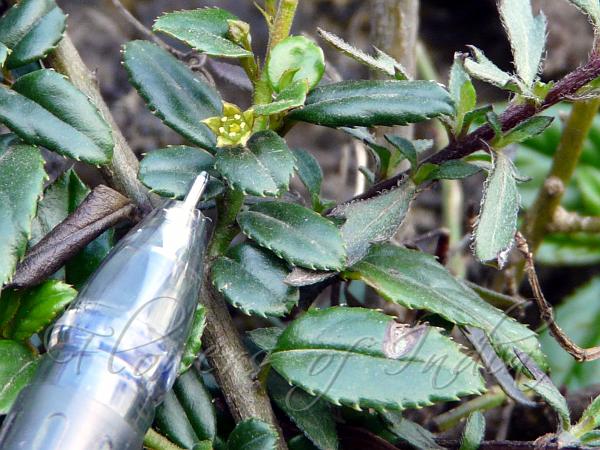|
| Creeping Buckthorn |
|

|

| File size | 365689 |
| Original date | 4/13/08 4:45 PM |
| Resolution | 1588 x 1191 |
| Flash | Flash did not fire, auto |
| Focal length | 17.0mm |
| Exposure time | 1/50s |
| Aperture | 3.6 |
| Focus Distance | |
| Metering Mode | Multi-segment |
| Camera make | Panasonic |
| Camera model | DMC-FZ18 |
| Sensor type | OneChipColorArea |
|
|
|
|
Photo: |
Botanical name: Rhamnus procumbens Family: Rhamnaceae (Ber family)
Synonyms: Rhamnus rupestris
Synonyms: Rhamnus rupestris
Creeping Buckthorn is a small, climbing shrub with prostrate thornless
branches. Branchlets are slender, with numerous warts. Stipules are needle-
shaped, 3-4 mm, persistent. Leaf-stalks are very short, 1-2 mm, minutely
velvety. Leaf blade is yellow-green on the underside, deep green above,
shiny, elliptic to lanceshaped, 1.5-2.5 × 0.8-1.5 cm, thinly leathery. Lateral veins
are 3-4 pairs, prominent on the underside, impressed above. Leaf base is
broadly wedge-shaped, margin slightly curled, saw-toothed, with pointed
tip. Flowers are polygamous, 5-merous, 1-3-clustered in axils of small
leaflike bracts, bracts narrowly elliptic, up to 1 cm. Flower-stalks are
5-6 mm. Bisexual flowers are broadly bell-shaped. Sepals are broadly ovate-
triangular, about 2 mm, sparsely downy, with distinct midvein above, tip
pointed. Petals are absent. Stamens are about 1 mm. Disk is thin,
disk-shaped. Ovary is 3-celled, style 3-lobed or cleft to half. Fruit is
round, 5 mm in diameter, green, black at maturity, with persistent sepal
at base, with 3 or sometimes 2 stones. Fruiting stalk is 7-8 mm long.
Creeping Buckthorn is found in the Himalayas, from Punjab to Bhutan, at
altitudes of 1800-3000 m. Flowering: June-July.
| Identification credit: Krishan Lal | Photographed in Mussoorie, Uttarakhand. |
• Is this flower misidentified? If yes,